17 JANUARY 2011
YOUR WORDS
Readers are invited to add their comments to any story. Click on the article to see and add.
BTN DISTRIBUTION
BTN also goes out by email every Sunday night at midnight (UK time). To view this edition click here.
- COMMENT: Bring on Keith Williams British Airways
- Accor adds to UK portfolio
- Air Canada gets into Toronto City
- Air New Zealand news
- BAA closes a miserable year
- Birmingham operation for 14-seat executive aircraft
- Brussels to Paris - in conference
- Embraer Phenom 300 into Europe
- Four Seasons in London expansion
- Highlands and Islands look forward to a better year
- London City Airport visionary dies
- Monarch adds to Cyprus airports
- Overseas visits from the UK fall
- Plymouth to lose vital London link
- Provence via Eurostar
- Qantas puts the A380 back into service
- Sabre and American Airlines
- Saudia joins airline alliance
- Seoul Airport Rail Link is now open
- Transport for London update including London City Airport
- Virgin Atlantic sends a letter to BAA
- ON TOUR: Arik Air of Nigeria
- MOTORING UPDATE by Ted Wilkinson
- AND FINALLY: Goal line technology
The Business Travel News
PO Box 758
Edgware HA8 4QF
United Kingdom
info@btnews.co.uk
© 2022 Business Travel News Ltd.
Air Canada gets into Toronto City
 Toronto’s controversial Billy Bishop Toronto City Airport will have a second operator from February onwards with Air Canada making a return after five years. Locally built Bombardier Q400 flights will be operated by Sky Regional Airlines.
Toronto’s controversial Billy Bishop Toronto City Airport will have a second operator from February onwards with Air Canada making a return after five years. Locally built Bombardier Q400 flights will be operated by Sky Regional Airlines.
Situated minutes from downtown Toronto the airport is unique in that a very short ferry ride is required in order to make the terminal.
Although dating back to 1939 it was not until the arrival of Porter Airlines and the Q400 that the airport has had any impact on Toronto’s Pearson International services. However the airline’s steady growth since that time, including services as far afield as Boston and New York Newark, has resulted in continued interest from Air Canada. Sky Regional is expected to compete on a number of routes and plans initially to operate five ‘planes. For its part Porter has a new terminal under construction and is innovative in what it offers to customers. A pedestrian tunnel is planned for later this year. www.aircanada.com www.torontoport.com/Airport.asp
Birmingham operation for 14-seat executive aircraft
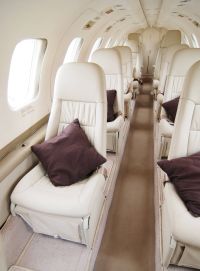 Aeronova, the Valencia-based specialist business aircraft operator, is to base a 14-seat Fairchild Metro III at Birmingham Airport. Operating since 1996 the company has now grown its Metro fleet to six aircraft of the type. The Metro fits in neatly between the larger Jetstream 31/32 and the much smaller Cessna 421 and Piper Navajo series. It is fully pressurised and has a cruising speed of around 300 knots.
Aeronova, the Valencia-based specialist business aircraft operator, is to base a 14-seat Fairchild Metro III at Birmingham Airport. Operating since 1996 the company has now grown its Metro fleet to six aircraft of the type. The Metro fits in neatly between the larger Jetstream 31/32 and the much smaller Cessna 421 and Piper Navajo series. It is fully pressurised and has a cruising speed of around 300 knots.
Aeronova is probably best known for its comprehensive ad hoc cargo charter operation but in recent times has been increasing its passenger operation which is now 20% of its work. Birmingham, with its well located general aviation set-up and excellent motorway connections, was chosen as the ideal UK operational base.
Basil O’Fee of Northpoint Aviation, who has been appointed as the UK and Irish passenger charter GSA for Aeronova observed: “This aircraft fits in nicely. Small to medium sized groups currently are forced to commit to much larger solutions than required, and this 14-seat option will be greatly welcomed in the UK market.” He noted that a further Metro, in 18-seat configuration, was available from Lydd in Kent most Tuesdays and Thursdays, due to other current commitments. www.northpointaviation.com
Four Seasons in London expansion
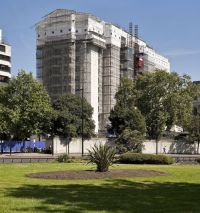 Four Seasons, the Canadian hotel and resort group, is currently focusing much on London, with a major opening and the announcement of what will probably be the largest hotel in the City of London.
Four Seasons, the Canadian hotel and resort group, is currently focusing much on London, with a major opening and the announcement of what will probably be the largest hotel in the City of London.
The much anticipated re-opening of Four Seasons Park Lane has now been set for 31 January. The 192-suite 5-star property includes 53 rooms providing a large wet room rather than a bathroom with tub. There are 20 Conservatory Suites with four over looking Hyde Park, each with a garden terrace.
At Liverpool Street, in the heart of the city, the Four Seasons will form part of the 43-storey Heron Plaza development, now under way next door to the virtually complete Heron Tower. 190 hotel suites and 120 Four Seasons-branded residences, as well as restaurants, conference and banqueting facilities, a gym, spa and swimming pool will be provided.
Four Seasons has also been represented in Canary Wharf since the early 1990s the 142-suite property the only hotel in the central complex. www.fourseasons.com
Monarch adds to Cyprus airports
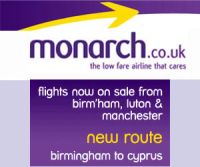 Monarch Airlines is to add Paphos in western Cyprus to services to the EU’s most easterly member. The capital Larnaca has been a destination since 2007 carrying over 300,000 passengers annually. The new scheduled flights to Paphos will operate from Birmingham, Gatwick and Manchester on Wednesdays and Sundays starting from 4 May 2011.
Monarch Airlines is to add Paphos in western Cyprus to services to the EU’s most easterly member. The capital Larnaca has been a destination since 2007 carrying over 300,000 passengers annually. The new scheduled flights to Paphos will operate from Birmingham, Gatwick and Manchester on Wednesdays and Sundays starting from 4 May 2011.
Monarch flies to Cyprus, Gibraltar, Portugal, Spain and Turkey from Birmingham, Gatwick, Luton and Manchester airports with all the year-round services. It offers a range of hot and cold meals that can be pre-booked or purchased onboard, with prices from £3. To enable customers to select where in the cabin they sit and ensure that families and groups sit together, seats can also be pre-booked from £7.50 per one-way flight, or from £15 extra-legroom seats are available, which offer up to six inches of extra space. www.monarch.co.uk
Provence via Eurostar
 Eurostar, the high-speed rail service between the UK and mainland Europe, has confirmed that once again this coming summer it will offer a direct weekly service to Avignon in the heart of Provence. It will operate every Saturday from 9 July to 10 September 2011 from London St Pancras to Avignon Centre Station. Both Standard Class and Premier will be available. Connecting fares are also obtainable from over 200 towns and cities across the UK.
Eurostar, the high-speed rail service between the UK and mainland Europe, has confirmed that once again this coming summer it will offer a direct weekly service to Avignon in the heart of Provence. It will operate every Saturday from 9 July to 10 September 2011 from London St Pancras to Avignon Centre Station. Both Standard Class and Premier will be available. Connecting fares are also obtainable from over 200 towns and cities across the UK.
Whilst it is possible to make the connections all year round the real advantage is the speed of the service, around five hours from Ashford to the city, once the home of a series of Popes, and also noted for its famous bridge "Sur le pont d'Avignon". Unlike the TGV, which stops at a station on the outskirts, Eurostar goes direct to Avignon Centre, the terminus just a few minutes walk into the centre. www.eurostar.com www.avignon-tourisme.com
Saudia joins airline alliance
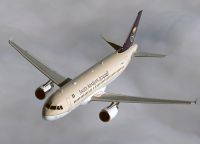 Skyteam has confirmed that Saudi Arabian Airlines, universally known as Saudia, and a dry airline, will join the alliance in 2012. After Royal Jordanian, who are part of oneworld, it will be only the second carrier in the region to become a partner of one of the three major groupings. Currently resident at Heathrow T3 the airline is set to move to T4, joining its Skyteam colleagues, later this year.
Skyteam has confirmed that Saudi Arabian Airlines, universally known as Saudia, and a dry airline, will join the alliance in 2012. After Royal Jordanian, who are part of oneworld, it will be only the second carrier in the region to become a partner of one of the three major groupings. Currently resident at Heathrow T3 the airline is set to move to T4, joining its Skyteam colleagues, later this year.
Other carriers set to join Skyteam over the next couple of years include Garuda Indonesia, Aerolíneas Argentina, China Airlines, China Eastern and its subsidiary Shanghai Airlines. www.saudiairlines.com
Virgin Atlantic sends a letter to BAA
 Virgin Atlantic has written to BAA Ltd advising that they will be withholding airport fees until the end of their inquiry into the December snow chaos. Virgin claims that BAA were slow to react to the severe weather conditions. The airline says it has also officially advised the Department of Transport of its action and shares the Secretary of State's frustration at the absence of any penalties it can enforce on airport operators under the current regulation.
Virgin Atlantic has written to BAA Ltd advising that they will be withholding airport fees until the end of their inquiry into the December snow chaos. Virgin claims that BAA were slow to react to the severe weather conditions. The airline says it has also officially advised the Department of Transport of its action and shares the Secretary of State's frustration at the absence of any penalties it can enforce on airport operators under the current regulation.
Virgin Chief Executive Steve Ridgway’s frustrations can been seen in this quote. “Despite the airport operating conditions being way beyond our control, Virgin Atlantic is taking responsibility by paying out millions to customers that suffered disruption to their Christmas travel plans. We are keen that BAA also feels a strong sense of accountability to the consumer and that minds are focused on delivering a fully independent and robust inquiry by its deadline in March."
Not related at all to the airport problems, but clearly a strengthening of his hand, Mr Ridgeway has been appointed Chairman of the Association of European Airlines (AEA) for 2011, taking over from Willie Walsh. www.virgin-atlantic.com
AND FINALLY: Goal line technology
If FIFA were around 120 years ago they would probably have banned the goal net as “advanced technology”. Video goal line cameras are of course forbidden by this forward thinking organisation responsible for the “Dual in the Desert”, the World Cup of 2022.
In any event readers might like to learn that the goal net was invented by a Liverpool engineer, John Alexander Brodie. It was initially used in an experimental match at Nottingham in January 1891 (exactly 120 years ago). The first footballer ever to 'put the ball in the back of the net' was Fred Geary of Everton, a prolific goal scorer of those times . The referee in that game was Sam Widdowson, the man who invented shin pads. The first Cup Final to use goal nets was at the Oval in 1892 between West Bromwich Albion and Aston Villa with the Baggies winning 3-0.
COMMENT: Bring on Keith Williams British Airways
Last week’s forceful and most interesting ON THE SOAPBOX by the new International Airlines Group (IAG) Chairman Antonio Vazquez deservedly started the year off and is itself worthy of COMMENT.
AERBT would admit not to being in favour of the link-up between British Airways and Iberia in the past. It seemed fraught with differences in philosophy and attitudes. But that is behind us now and over a decade of working together in oneworld has shown that the two carriers can assimilate for the common good. Fortunately English is the language of the airlines which is something that the Spanish will have to come to terms with. Using English operationally has clearly benefited Lufthansa. The International Airlines Group looks like it will work from a financial point of view. It now has to function in the complexity of an actual working airline environment.
Willie Walsh officially took over as British Airways Chief Executive Officer in October 2005 from Sir Rod Eddington, who had steadied a rocky ship. He arrived from Aer Lingus, then a member of oneworld, with a reputation as a cost cutting CEO, a pilot by training and with a masters business degree from Trinity College Dublin.
His tenure has been far from uneventful dealing with an aggressive and largely unhelpful cabin staff trade union unwilling to acknowledge that airlines had moved on in the 21st century and were no longer the government backed show piece goliaths of old. He has had to deal with record losses, what turned out to be a short term crisis with the move into Terminal 5, fuel at record cost levels and volcanic ash and snow problems.
It has been argued that BA has taken its eye off the commercial front but the airline continues to run smoothly and the spirit of the majority of staff was seen in the way that it continued to fly during the worst of the Unite Union strikes.
The argument that BA would abandon South America and hand that important market over to Iberia seems to have been repudiated with Rio as a new non-stop route and Buenos Aires about to come on-line. Walsh quite rightly emphasised that for Heathrow to remain as the world’s number one international airport, and all the benefits that brings, a much more enlightened attitude is required by government. His new role as Chief Executive of IAG is clearly a challenge but one to which he is eminently suited.
Taking charge of British Airways as CEO is Keith Williams (54), the airline’s Chief Financial Officer (CFO) for the last five year years. He also sits on the Management Board of what is now the airline’s parent company, IAG, and is a Non-executive Board Member of Transport for London.
As CFO of British Airways over the previous five years he has played a leading part in the airline’s achievement of a record operating margin in 2007, before steering it through the worst recession in its history and masterminding a solution to its long-standing pensions deficit.
Keith joined BA in 1998 as Group Treasurer and Head of Tax and was heavily involved in restructuring the airline’s finances after the aviation slump that followed the terrorist attacks of 9/11. Previously he had seen service with such luminaries as Reckitt and Colman, Apple Europe and Arthur Andersen. He is a graduate of Liverpool University, where he obtained a first class honours degree in history and archaeology.
Last week in AERBT Antonio Vazquez spoke of the future of IAG and British Airways in which Keith Williams will play a vital role. Most of the airline’s inherent problems are either solved or on their way to being solved. Next year the A380 arrives and soon after that the 787. The all new 777s are joining the fleet and the route structure looks solid and well founded. The airline is an Olympic partner for 2012. The quality of the product must be upheld in the face of very serious competition. One could argue that BA should shout its case a little more. And any integration with Iberia needs to be seamless.
After 12 years with BA Keith Williams is now what used to be described as a “proper airline man”. The experience is there. He has seen the good times and the bad times. He has the attributes and deserves success as the leader in charge. There is every indication is that it will happen.
Malcolm Ginsberg
Editor in Chief
Air New Zealand news
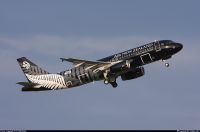 Airbus has confirmed that Air New Zealand’s unique all black A320 aircraft is nearly ready for delivery from the completion centre at Hamburg. The aircraft is the first of Air New Zealand’s new domestic Airbus A320 jet fleet and will be the only aircraft to be painted with the exclusive livery. ANZ has 14 of the 171-seat aircraft on order, which will be progressively introduced into the airline’s fleet from early February.
Airbus has confirmed that Air New Zealand’s unique all black A320 aircraft is nearly ready for delivery from the completion centre at Hamburg. The aircraft is the first of Air New Zealand’s new domestic Airbus A320 jet fleet and will be the only aircraft to be painted with the exclusive livery. ANZ has 14 of the 171-seat aircraft on order, which will be progressively introduced into the airline’s fleet from early February.
The interior for the new A320 fleet will mirror the recently revealed colour-scheme and materials being fitted into the airline’s new fleet of Boeing 777-300 aircraft, and includes LED mood lighting throughout the cabin.
Other news from ANZ is that a codeshare has been signed with Virgin Atlantic offering more flexibility and choice on routings between the UK and New Zealand for both carriers’ passengers. The airline has also welcomed the news that Guangzhou-based China Southern Airlines will begin a new direct service to Auckland early this year. www.airnz.co.nz
Brussels to Paris - in conference
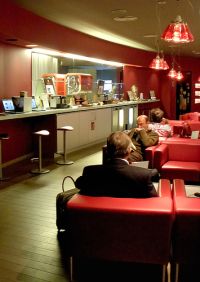 European high speed rail operator Thalys has introduced its new onboard private lounge Le Salon on the Brussels – Paris route. Journey time is just 1hr 22mins. Aimed at business travellers, each salon consists of four chairs surrounding a conference table. Included is wi-fi access and plug sockets.
European high speed rail operator Thalys has introduced its new onboard private lounge Le Salon on the Brussels – Paris route. Journey time is just 1hr 22mins. Aimed at business travellers, each salon consists of four chairs surrounding a conference table. Included is wi-fi access and plug sockets.
Passengers booking Le Salon are offered the same services as in Thalys' Business Class, Comfort 1, which include at-seat dining, wi-fi access, newspapers and magazines.
As a guide, to reserve Le Salon on the Paris – Brussels journey, it will cost €600 for a maximum of four people. Thalys also operates from Brussels to Cologne and Amsterdam in only 1hr 47mins and 1h 53mins respectively. www.thalys.com
Highlands and Islands look forward to a better year
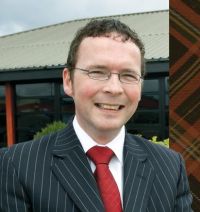 Inverness-based Highlands and Islands Airports Ltd, 100% owned by the Scottish government, is looking forward to a better 2011 than 2010. It was hit hard by the Iceland ash problem and also very heavy snow at both the beginning and end of last year. However it does say that lessons learnt with the first weather problems enabled a far better handling of the December difficulties than was anticipated.
Inverness-based Highlands and Islands Airports Ltd, 100% owned by the Scottish government, is looking forward to a better 2011 than 2010. It was hit hard by the Iceland ash problem and also very heavy snow at both the beginning and end of last year. However it does say that lessons learnt with the first weather problems enabled a far better handling of the December difficulties than was anticipated.
In 2010 passenger numbers over the ten airports it operates was down by 12% to just over one million. The failure of Highland Airways in March did not help matters. Dundee Airport, which was taken over from the local city council in September 2007 is causing concern, with question marks over the service to London City Airport, considered a lifeline route. The former Suckling/Scot Airways service is now operated by CityJet using a VLM Fokker 50 but heavy charges at the London end may mean a reduction of London flights and rescheduling for the summer season.
At Inverness the airport will offer a 24-hour opening from September, which should help to attract freight operations, and its use by transatlantic business jets. At the same time a new business park is due to open. www.hial.co.uk
Overseas visits from the UK fall
 Britain’s Office of National Statistics has published figures that show the number of overseas trips taken by people from the UK fell sharply in 2010. Whilst the numbers are only to the end of November, December will see a further substantial fall due to problems associated with the unusual adverse weather conditions. Business travel was down 6% to 6.7m in the same period and foreign holiday trips taken by UK residents totalled 36.3m, a fall of 7%.
Britain’s Office of National Statistics has published figures that show the number of overseas trips taken by people from the UK fell sharply in 2010. Whilst the numbers are only to the end of November, December will see a further substantial fall due to problems associated with the unusual adverse weather conditions. Business travel was down 6% to 6.7m in the same period and foreign holiday trips taken by UK residents totalled 36.3m, a fall of 7%.
During the 12 months to November 2010, the number of visits by overseas residents to the UK remained broadly the same when compared with the 12 months to November 2009, at 29.8m. From Europe the numbers were up just 1% from 22m, 22.2m, North America down 6% from 3.5m to 3.3m and with other parts of the world increasing 2% from 4.2m to 4.3m. Visits for business reasons increased 4% and holiday visits increased 2% with visits to friends and relatives falling 4%. www.statistics.gov.uk
Qantas puts the A380 back into service
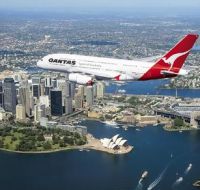 Airbus A380 aircraft have been put back into service on the Qantas Los Angeles – Sydney route, one that regularly requires the use of maximum engine thrust. In line with the airline’s safety-first approach, the suspension of the flights was implemented to enable the airline to monitor the performance of the Rolls-Royce Trent 900 engine. After extensive engineering analysis and close consultation with Rolls-Royce, Airbus and the European and Australian regulators, Qantas, Rolls-Royce and the Civil Aviation Safety Authority are now satisfied that it is appropriate for Qantas to resume A380 flying on the Los Angeles – Australia services.
Airbus A380 aircraft have been put back into service on the Qantas Los Angeles – Sydney route, one that regularly requires the use of maximum engine thrust. In line with the airline’s safety-first approach, the suspension of the flights was implemented to enable the airline to monitor the performance of the Rolls-Royce Trent 900 engine. After extensive engineering analysis and close consultation with Rolls-Royce, Airbus and the European and Australian regulators, Qantas, Rolls-Royce and the Civil Aviation Safety Authority are now satisfied that it is appropriate for Qantas to resume A380 flying on the Los Angeles – Australia services.
For the remainder of January, Qantas will operate 14 A380 services per week, on the following operations:
QF9/10 (Melbourne – Singapore – London): three services per week.
QF11/12 (Sydney – Los Angeles): four services per week.
QF31/32 (Sydney – Singapore – London): daily.
In a separate announcement Qantas said it will launch direct flights from Sydney to Dallas-Fort Worth (DFW) from 16 May 2011 but drop its Sydney – San Francisco (SFO) at the same time. A stronger relationship is expected with American Airlines who are based in DFW. www.qantas.com
Seoul Airport Rail Link is now open
 Ten years after it opened, Incheon, Seoul’s international aviation gateway, has finally gained a non-stop express rail link to the city centre. Totalling 58kms the line is an extension of an existing link between Incheon and the former Gimpo International Airport now used mainly for domestic and regional flights.
Ten years after it opened, Incheon, Seoul’s international aviation gateway, has finally gained a non-stop express rail link to the city centre. Totalling 58kms the line is an extension of an existing link between Incheon and the former Gimpo International Airport now used mainly for domestic and regional flights.
The non-stop service departs every 30 minutes, takes 43 minutes, with a cost of approx US$11. There is a stopping train every six minutes calling at ten stations along the line, with the charge just US$3 for the ten-minute longer journey.
A luggage terminal has also opened in Seoul Station, allowing passengers to check-in and drop off items to be transported to the airport (currently limited to Korean Air and Asiana Airlines). http://seoul-airport.com
ON TOUR: Arik Air of Nigeria
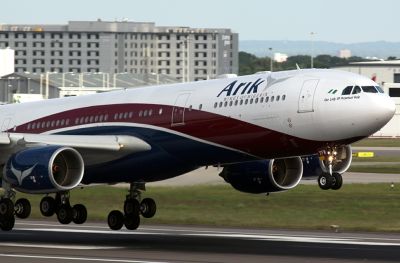 Arik is an airline name that you will not be familiar with unless you come from Nigeria or have a need to go the that country. But you ought to. Arik flies daily from Heathrow to the main commercial complex of Lagos, five times per week to the capital Abuja, and also has a Monday, Wednesday and Friday service from New York Kennedy (JFK) to Lagos International Airport. Flights are by Airbus A340 aircraft in a two-class configuration as comfortable as any you will come across. The airline offers extensive regional services including South Africa.
Arik is an airline name that you will not be familiar with unless you come from Nigeria or have a need to go the that country. But you ought to. Arik flies daily from Heathrow to the main commercial complex of Lagos, five times per week to the capital Abuja, and also has a Monday, Wednesday and Friday service from New York Kennedy (JFK) to Lagos International Airport. Flights are by Airbus A340 aircraft in a two-class configuration as comfortable as any you will come across. The airline offers extensive regional services including South Africa.
Let’s face it Nigeria has not been too successful when it comes to airlines.
Nigeria Airways had been founded in 1958 and flown some of the great aircraft of the decades that followed including the Comet 4, VC10 and Boeing 747. In 2003 it failed with tales of mismanagement and corruption. Richard Branson launched Virgin Nigeria in 2005 but that arrangement fell apart in 2008, the current Air Nigeria regional operation the result.
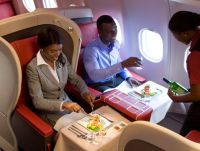 In 2004 Sir Joseph Arumemi-Ikhide, a renowned Nigerian entrepreneur with extensive business interests across several economic sectors, but especially in the engineering and oil industries, incorporated Arik Air. His own travels within Nigeria he found fraught with very limited railway lines and a poor road infrastructure. A private jet – and he still operates a Bombardier Global Express – was not the answer. His son Dr Michael Arumemi-Ikhide (34), a graduate from St Andrews University Scotland, runs the airline very much hands-on.
In 2004 Sir Joseph Arumemi-Ikhide, a renowned Nigerian entrepreneur with extensive business interests across several economic sectors, but especially in the engineering and oil industries, incorporated Arik Air. His own travels within Nigeria he found fraught with very limited railway lines and a poor road infrastructure. A private jet – and he still operates a Bombardier Global Express – was not the answer. His son Dr Michael Arumemi-Ikhide (34), a graduate from St Andrews University Scotland, runs the airline very much hands-on.
Arik Air made its first scheduled flight on 30 October 2006 from Lagos Murtala Muhammed International Airport to the national capital of Abuja using a Bombardier CRJ 900 aircraft. The service continues to this day, normally a two-class Boeing 737-800 with four return flights. In November 2010 the airline welcomed its six millionth traveller. Last year it carried 2.3m passengers and had a turnover of US$400m.
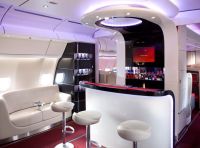 On the international front Arik serves Heathrow and JFK. Houston is firmly in the sights for 2010 and Sao Paulo is also being considered. Note the oil industry connections. The airline currently operates to 27 destinations. There are 24 scheduled airports within Nigeria but many of these are VFR (visual flight rules) and consequently subject to delays and cancelations due to dust clouds. This can be an inconvenience.
On the international front Arik serves Heathrow and JFK. Houston is firmly in the sights for 2010 and Sao Paulo is also being considered. Note the oil industry connections. The airline currently operates to 27 destinations. There are 24 scheduled airports within Nigeria but many of these are VFR (visual flight rules) and consequently subject to delays and cancelations due to dust clouds. This can be an inconvenience.
Arik has a fleet of 26 aircraft, mostly owned but including a pair of Airbus A340 wet-leased from Portuguese operator Hi-Fly. The contract on these aircraft is due to expire at the end of the year but indications are that they will be retained. The -500 series ‘planes were originally built for Kingfisher Airlines to a very high two-class specification but have been artfully rebranded. Unless you knew different you would think that they were Arik from day one. Even the lighted seat controls say Arik. Premier Class clients are offered one of the largest on-board lounges and bar seen in the air. Catering and service is up to international standards. A two-class Airbus A330 is used on a daily service to Johannesburg. Boeing 737s are the norm on regional routes, and even Abuja to Heathrow. There is a proper and very comfortable Premier Class of three rows 2+2. On other short haul services Bombardier Q400 and CRJ900s find favour. Boeing 777s are pencilled in for the future but the airline could just as easily go A330.
 Arik International is established outside Nigeria with offices in the City of London. These have proved ideal for European marketing, procurement, finance and travel trade and inter airline activities. The airline has been adept in recent times in cementing contacts with other carriers regarding interline and code share arrangements. The London office is essential for these important relationships as well as gaining vital rapport with suppliers and trade organisations.
Arik International is established outside Nigeria with offices in the City of London. These have proved ideal for European marketing, procurement, finance and travel trade and inter airline activities. The airline has been adept in recent times in cementing contacts with other carriers regarding interline and code share arrangements. The London office is essential for these important relationships as well as gaining vital rapport with suppliers and trade organisations.
The arrival of Kevin Steele as Senior Vice President Commercial last November marked another forward step for the airline, the 30-year British Airways veteran more recently occupied in Saudi Arabian airline activities and prior to that very much involved with the successful introduction of Eithad. He sees Arik Air as a vital segment in the expansion of airline activities in West Africa with Lagos as a hub.
There is a plan now under way to eradicate many of the inefficiencies that have found their way into the operation of the airline during its short life. Aircraft utilisation needs to be significantly improved and problems such as fuel supply at Logos eradicated. It seems incredible that in a country that is a major oil exporter the airline's less than impressive timekeeping is in the main due to delays with the bowsers at the country's airports. This does not affect so much international carriers at Lagos who generally speaking have only a single daily flight to refuel.
 For the public and the travel industry the first results of Mr Steele’s efforts is a new web site to be launched on 1 March followed by a completely revised timetable due on-line at the end of that month. Connections and ticketing both ways between regional and international sectors at Lagos are set to progress and a target of a 30% improvement in revenue has been set without any increase in the size of the fleet. The airline expects to be cash positive in 2012. Whilst it cannot compete with the UK carriers in terms of universal incentive schemes a frequent flyer programme is being introduced and the Heathrow lounge arrangement will be brought up to the standard required for international competiveness. The present offering might be OK for European flights but not long haul services. Free Heathrow Express tickets for Business Class clients is another possibility.
For the public and the travel industry the first results of Mr Steele’s efforts is a new web site to be launched on 1 March followed by a completely revised timetable due on-line at the end of that month. Connections and ticketing both ways between regional and international sectors at Lagos are set to progress and a target of a 30% improvement in revenue has been set without any increase in the size of the fleet. The airline expects to be cash positive in 2012. Whilst it cannot compete with the UK carriers in terms of universal incentive schemes a frequent flyer programme is being introduced and the Heathrow lounge arrangement will be brought up to the standard required for international competiveness. The present offering might be OK for European flights but not long haul services. Free Heathrow Express tickets for Business Class clients is another possibility.
Where the airline does score is the luggage allowance, essential with Nigerians not noted for travelling lightly. For Economy passengers it is 2 x 30kg per person plus whatever you can manage as carry-on. But even with this generosity the airline says that overweight baggage is a useful revenue contributor.
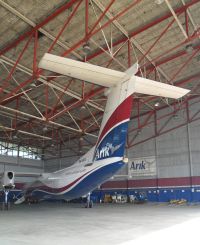 Arik Air has recently been inspected by IATA International Safety Audit (IOSA) and whilst the results will not be published until March every indication is that the airline will pass with flying colours. An investment in a new Operations Control Centre (OCC) to be ready later this year shows how forward thinking the airline is. In fact the present arrangement is pretty impressive. The airline's main hangar at Lagos is being modified to take the large Airbus aircraft with Lufthansa Tecknik heavily involved in engineering support and flight deck services. Major checks are contracted out to third parties and this is likely to continue for the future. Pilots are a mixture of expatriates and nationals with a training programme under way locally. Likewise with the cabin staff but the airline plans to continue offering the ethic mix.
Arik Air has recently been inspected by IATA International Safety Audit (IOSA) and whilst the results will not be published until March every indication is that the airline will pass with flying colours. An investment in a new Operations Control Centre (OCC) to be ready later this year shows how forward thinking the airline is. In fact the present arrangement is pretty impressive. The airline's main hangar at Lagos is being modified to take the large Airbus aircraft with Lufthansa Tecknik heavily involved in engineering support and flight deck services. Major checks are contracted out to third parties and this is likely to continue for the future. Pilots are a mixture of expatriates and nationals with a training programme under way locally. Likewise with the cabin staff but the airline plans to continue offering the ethic mix.
Walking around the Arik Air compound at Murtala it is very apparent the efforts being made to reshape and tidy up the whole complex, with completion expected by the year end. The company's remodelled head office dates back to 1958 and was built for the long forgotten West African Airways Corporation, a commemorative plaque setting out the history. What is also very apparent is the friendly attitude of all concerned, and not only to visitors. There seemed to be a sociable buzz about the whole place.
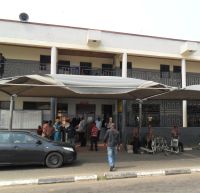 Arik Air is dependent on third party operators for many of the services that are part of an airline operation. This is a problem in Nigeria which seems to go along at its own pace. Even as essentially the international flag carrier for the country changing the thinking is not easy. The domestic terminals are on the other side of the runway from international arrivals with Arik in a building that dates from the 1950s and has never been upgraded! The airline would love to fabricate a dedicated 21st century purpose-built domestic terminal. Gaining approval is a matter of patience. It would like to be self-handling too, but this does not seem possible.
Arik Air is dependent on third party operators for many of the services that are part of an airline operation. This is a problem in Nigeria which seems to go along at its own pace. Even as essentially the international flag carrier for the country changing the thinking is not easy. The domestic terminals are on the other side of the runway from international arrivals with Arik in a building that dates from the 1950s and has never been upgraded! The airline would love to fabricate a dedicated 21st century purpose-built domestic terminal. Gaining approval is a matter of patience. It would like to be self-handling too, but this does not seem possible.
There is at least some good news. An airside bus service between the domestic and international terminal areas is to be introduced which will enable Arik to offer proper through connecting services. Under construction is a brand new international lounge which the airline plans to move into shortly. But even that will be run by an outside contractor.
Unlike the State boosted Middle East airlines Arik Air is a private organisation, with stock market aspirations but presently relying on bank and individual funding. As such it has to be careful on its way forward with no huge aircraft orders or sponsorship schemes to lift its international visibility. Yes it does list the Boeing 787 in its forward thinking, but that is a long way off. Providing it can eradicate wrinkles in the system it could prove to be the West African airline for the 21st century. www.arikair.com
Accor adds to UK portfolio
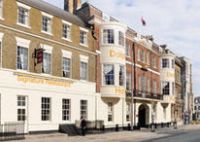 Mercure, part of the Paris-based Accor operation, has signed a franchise agreement with Focus Hotels, adding ten hotels to its UK network in the first quarter of 2011. This forms part of French Accor’s aggressive expansion strategy to increase its British base to 300 hotels by 2015. By the summer of this year Mercure will have 43 UK properties. Other Accor brands include Ibis, Novotel and Sofitel.
Mercure, part of the Paris-based Accor operation, has signed a franchise agreement with Focus Hotels, adding ten hotels to its UK network in the first quarter of 2011. This forms part of French Accor’s aggressive expansion strategy to increase its British base to 300 hotels by 2015. By the summer of this year Mercure will have 43 UK properties. Other Accor brands include Ibis, Novotel and Sofitel.
Focus Hotels is a collection of quality midscale hotels with a wide variety of styles at a range of excellent locations throughout England. The group has systematically upgraded its product over the past few years, investing heavily in refurbishment and training with a view to identifying suitable franchising partners. The partnership with Mercure hotels will allow the ten hotels to retain their individuality and style whilst enabling them to reach an international market. www.accorhotels.com
BAA closes a miserable year
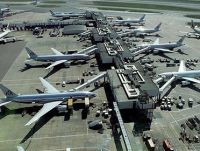 Heathrow proved to be the only star in what was a miserable year for BAA Ltd, the Spanish-owned airport operator. Even Heathrow had its problems with the political decision to abandon the third runway project, after it had expensively passed at the legal and public enquiry examinations, and the natural difficulties caused by both snow and volcanic dust.
Heathrow proved to be the only star in what was a miserable year for BAA Ltd, the Spanish-owned airport operator. Even Heathrow had its problems with the political decision to abandon the third runway project, after it had expensively passed at the legal and public enquiry examinations, and the natural difficulties caused by both snow and volcanic dust.
Figures published last week show an overall decline in passenger numbers at the six BAA airports to 2.8% year-on-year, the throughput figure at 103.9m. Heathrow saw record figures in the months from July to November easily keeping its position as the world’s top airport in terms of international passenger throughput.
Looking towards 2011 and happier times Southampton now claims to be the number one UK gateway to France with 14 destinations offered in 2011 including three new Flybe summer routes to Beziers, Clermont-Ferrand and Pau. Stansted, which has had the most dramatic decline, is looking forward to the new BMI baby launch to Belfast City service in March – a route previously served by Ryanair, and Pegasus Airlines is to offer Beirut via Istanbul as well as launching new direct services to Izmir from 1 May 2011. www.baa.com
Embraer Phenom 300 into Europe
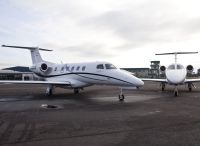 FlairJet, based at Oxford Airport, has become the first European operator to introduce the Embraer Phenom 300. Two aircraft, G-MGNE and G-GEIR arrived over the holiday period joining three of the smaller Phenom 100s which arrived during 2010.
FlairJet, based at Oxford Airport, has become the first European operator to introduce the Embraer Phenom 300. Two aircraft, G-MGNE and G-GEIR arrived over the holiday period joining three of the smaller Phenom 100s which arrived during 2010.
There is little doubt that the Phenom series has established new standards of comfort and performance in the light jet category. There is a saying that if it looks right it flies right and certainly the aircraft looks right. The Phenom 300 is one of the fastest aircraft in the category, reaching 521 mph (839 km/h or 453 knots) and can fly at an altitude of up to 45,000 feet (13,716 meters). Its range of 1,971 nautical miles (3,650 km) including fuel reserves, means the aircraft is capable of flying non-stop from Oxford to Athens, Moscow, Palma or Rome. www.flair-jet.com
London City Airport visionary dies
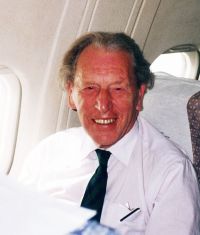 Reg Ward, one of the men chiefly responsible for the creation of London City Airport, has died aged 82. Mr Ward was Chief Executive of the London Docklands Development Corporation (LDDC) between 1981 and 1987. It was the body responsible for the regeneration of the Isle of Dogs and the building of Canary Wharf.
Reg Ward, one of the men chiefly responsible for the creation of London City Airport, has died aged 82. Mr Ward was Chief Executive of the London Docklands Development Corporation (LDDC) between 1981 and 1987. It was the body responsible for the regeneration of the Isle of Dogs and the building of Canary Wharf.
Tributes paid to Mr Ward included one from George Iacobescu, Chief Executive of Canary Wharf Group.
"Reg's legacy lies in the transformation of east London – without him, it just would not have happened."
At the LDDC, Ward was responsible for the idea of the Docklands Light Railway, London City Airport, Canary Wharf and was consulted by Iain Shearer for the ExCeL Exhibition Centre. His forthright style did not sit well with his colleagues in central government and he was eased out of the job shortly after the deal on Canary Wharf was signed. However, he is now viewed as the main driver behind the extraordinary change and development in London Docklands. Unlike many others (sometimes tax exiles) who created a lot less, Reg never received national honours, a fact that failed to rankle him, but annoyed his former close colleagues. www.lcacc.org/history
Plymouth to lose vital London link
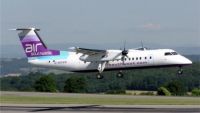 Eastern Airways, the new owner of Air South West, is to close both the Newquay and Plymouth Dash 8 services to Gatwick on 1 February, citing an 18% rise in the cost of operating at the London airport. The loss of the route is considered as a body blow by the city of Plymouth with poor road connections to the central parts of the UK, and an inadequate railway service. The city boomed from inward investment with the introduction of a four times daily air service to Heathrow by Brymon Airways in 1981, lost in 1993, the slots too valuable for 50-seat aircraft.
Eastern Airways, the new owner of Air South West, is to close both the Newquay and Plymouth Dash 8 services to Gatwick on 1 February, citing an 18% rise in the cost of operating at the London airport. The loss of the route is considered as a body blow by the city of Plymouth with poor road connections to the central parts of the UK, and an inadequate railway service. The city boomed from inward investment with the introduction of a four times daily air service to Heathrow by Brymon Airways in 1981, lost in 1993, the slots too valuable for 50-seat aircraft.
The big beneficiary of the closure is likely to be Flybe and Newquay Airport with passengers in West Devon and East Cornwall forced to use the former RAF St Mawgan and the Exeter-based carrier picking up Air South West customers. Flybe currently flies three times daily non-stop to Gatwick with a Q400. A lack of competition will affect fares.
The loss of the London services at Plymouth, and the possible closure of the airport, Gatwick representing nearly half of the airport’s throughput, can be directly attributed to the lack of imagination by those in authority whenever an extension of the runway was mooted. www.airsouthwest.com
Sabre and American Airlines
 American Airlines has said in a Texas court filing that Sabre, by reneging on a contract to distribute its tickets, has increased its costs causing a loss of billions of dollars in revenues and “irreparably” damage to its reputation. In the filing the airline laid out a bleak scenario if Sabre is allowed to proceed with plans, announced on 1 January, to terminate its distribution contract with American in August, and raise its fees and downplay its products in the meantime. This follows Expedia’s decision to drop American from its website. See AERBT 10 January 2010.
American Airlines has said in a Texas court filing that Sabre, by reneging on a contract to distribute its tickets, has increased its costs causing a loss of billions of dollars in revenues and “irreparably” damage to its reputation. In the filing the airline laid out a bleak scenario if Sabre is allowed to proceed with plans, announced on 1 January, to terminate its distribution contract with American in August, and raise its fees and downplay its products in the meantime. This follows Expedia’s decision to drop American from its website. See AERBT 10 January 2010.
Sabre, a privately held company that was once owned by American, said: “We are confident that our actions are well within our contractual rights, and we will aggressively defend against American Airlines’ baseless claims to the contrary.”
The filing provides a detailed insight into what has been a fractious but murky dispute between American and various companies that sell its tickets, including fare comparison sites and global distribution systems that connect airlines and travel agents. Both sides argue that what they are doing is in the public interest. www.aa.com
Transport for London update including London City Airport
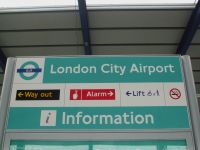 London is undergoing a massive transport restructuring, much of which is expected to be completed by the time of the 2012 Olympics. Crossrail will not be completed until later into the decade.
London is undergoing a massive transport restructuring, much of which is expected to be completed by the time of the 2012 Olympics. Crossrail will not be completed until later into the decade.
Presently most weekends work is taking place somewhere on the system which includes the Tube, London Overground, Tramlink and DLR. Transport for London (TfL) is urging everyone to “check before you travel” allowing extra journey time where necessary.
Latimer Road is now closed for three months. At weekends the Bakerloo Line from town stops at Queens Park, the Circle Line is suspended completely, as is the Hammersmith & City Line, the Jubilee Line between Stanmore and West Hampstead. Cannon Street is shut on Saturdays. The District Line will not run on Saturdays between Embankment and Dagenham East and on Sundays between Earl’s Court and Dagenham.
The Metropolitan Line is suspended between Harrow-on-the-Hill and Aldgate all weekend and passengers are advised to use the Chiltern Railways service to/from Marylebone.
The Overground has closures too and the DLR is suspended to London City Airport.
Out of central London for the most part buses replace trains but readers should check on the web sites. www.tfl.gov.uk/tfl/traveltools. http://www.tfl.gov.uk/tfl/livetravelnews/mobileservices/default.asp
MOTORING UPDATE by Ted Wilkinson
VW Golf Estate SE Blue Motion Stop+Start
A Generous but Miserly Estate
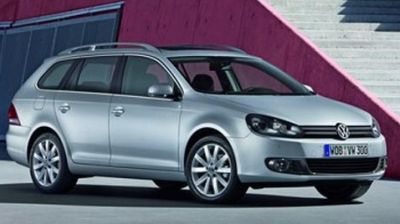 Why have a hatch back when you can have an estate car? Not so many years ago the answer was easier to define as estate cars tended to be bulky to achieve a serious advance on load space and it has taken a good deal of motor industry resources to gain interior space while saving on exterior dimensions.
Why have a hatch back when you can have an estate car? Not so many years ago the answer was easier to define as estate cars tended to be bulky to achieve a serious advance on load space and it has taken a good deal of motor industry resources to gain interior space while saving on exterior dimensions.
Today’s car design trends clearly prove this space without bulk gain, no more so than the latest 4th generation Golf Estate (based on the 6th generation Golf hatch back) I have been testing in eco-friendly 1.6-litre Blue Motion form. A vehicle that has been clearly developed to attract those with that 'want not waste not' attitude to their motoring budget and also to leave the UK taxman with zero take on road tax, at least for the first year.
Of course, the Golf hatch back that has grown in size (and stature with over 26 million buyers) is the iconic version but has spawned innovative variants including the open topped Eos, Jetta saloon, the slightly loftier Golf Plus and this latest estate version.
Whatever Estate variant one chooses from a long line-up, it is clearly evident to me that there is no compromise, this estate version measures only 336 mm longer than the hatch back but can swallow 505 litres of ‘cargo’ with all seats in place compared to 350 litres in the hatch back and a really useful 1,495 with both split fold rear seats flat – max load length is up to a useful 1.70 m. A load though hatch is also standard on all versions.
This scant size differential has resulted in a smart smooth-lined body style, the practical aspect only suggested by the presence of the roof rails, a new design in its entirety though clearly a member of the Golf family when viewed from the front.
From the comfortable driving seat there is the ambience of the Golf, the bench mark build quality and finish and the clearly defined instruments with familiar blue back lighting though design varies a little but style, layout and tasteful choice of trim materials confirm the Volkswagen DNA – would you believe the car is sourced from Mexico?
Creating an estate from either a hatch back or a saloon design has not always been successful when it comes to retaining driving character though successive Golf Estates have come off well as a worthy performer for the discerning driver as well as an easy going and safe vehicle for the more general sort of driver.
These good road manners result from a well honed fully independent suspension system that imparts excellent road grip (aided by traction control, electronic differential lock and stability control, plus an all disc braking system with both ABS anti-lock and HBA hydraulic brake assist and speed dependent power assisted steering.
The Blue Motion treatment that involves a weight saving ‘diet’, revised high gear ratios, low energy tyres and more, has sparked a lot of debate as an alternative to hybrid technology and when one considers the official combined consumption of 63 mpg and an urban figure of 54.3 mpg, giving a range of around 800 miles on a tank full of diesel then this particular version has a strong case.
Miserly it might be on fuel consumption and exhaust emissions (only 109 g/km) but this 1.6-litre engine punches well above its weight by producing a very competitive 103 bhp in a very dignified manner to provide a claimed top speed of 118 mph with 62 mph (100 kph) reached in a respectable 11.9 seconds.
The five speed gearbox is a positive and light acting device ideal for exploiting the power delivery to the full though there is plenty of power flexibility to suit the lazier driver – or they could opt for the optional DSG double clutch selectable automatic unit.
Undoubtedly the serious driver miser could extract more mileage by ensuring the stop+start system is used at every opportunity – it only requires selection of neutral to cut the engine and a depression of the clutch to restart.
A regenerative system operates under braking to ensure the battery is kept charged. I would add that this system could contribute to less driver stress when grappling with severe traffic congestion.
This Blue Motion version is based on the near top SE specification and comes extensively equipped, not just with the usual goodies like powered windows but with powered and heated mirrors, an air conditioning system that switches to re-cycle whenever reverse gear is selected or the windscreen washers are operated (thus avoiding fumes or the nasty aroma of washer fluid), a cocoon of airbags, automatic coming and leaving headlights system, cruise control, ISDOFIX child seat preparation, automatic driving lights, rain sensor wipers and much more. Options include a rear view camera (a first for this class of car?) at £160 though linked to a £1,445 satellite navigation system.
Not only a very competent and smart act but I suggest a serious proposition for a wide customer base…those wanting to size down a bit with no lifestyle sacrifices or a sage junior executive looking to get more for less?
Rivals include: Vauxhall Astra Estate, Peugeot 308 SW, Ford Focus Estate, Renault Megane Tourer.
STAR RATINGS (out of 10)
Performance 9
Handling 9
Transmission 9
Noise 9
Economy 10
Ride and Comfort 9
Accommodation 9
Styling 9
Brakes 9
Finish 9
Insurance rating: 18E. Price: £19,880.
NOTES FROM TED WILKINSON’S MOTORING DIARY
PUB GUIDE: Just out is the 2011 edition of the Good Pub Guide, more comprehensive and with iPhone search facility which adds just £3.99 to the cover price of £14.99 from Ebury Press and allows readers to use simple search filters to find a place to stay, perhaps for that more informal business lunch, one that accepts dogs or to find a real character place. In addition to 958 pages of pub info there’s blank forms at the back to allow the user to report their own views. www.thegoodpubguide.co.uk
AUDI: Europe’s best selling premium brand car range saw UK sales for last year were 99,828 – 9.5% up on the previous year. World sales hit 1,092,400. www.audi.co.uk
FIAT: An agreement has been signed by Fiat to supply certain car models to Opel. www.fiat.co.uk
LEXUS: a special winter version of the Lexus RX450h SEI hybrid model has been launched. Features include roof rails, front and rear under runs, rear bumper protection, a cool/hot storage box and a boot liner. Value of items is quoted £1,500 but offered at £499. Total price is £48,899. www.lexus.co.uk
PEUGEOT: Two additional version of the Peugeot 3008 Crossover model have been released – SR and ENVY, both based on the Sport model. The SR adds colour satellite navigation and Blue Tooth. Grip control, 16 inch allow wheels with mud and snow tyres, the EBVY dark tinted rear windows, external styling pack with brushed alloy trim, head-up display and a panoramic glass roof. www.peugeot.co.uk
TOYOTA: a CUSTOMER Satisfaction Programme has been launched to replace the electric water pump on certain Toyota Prius hybrid models. Toyota confirms that it is not a safety issue and does not constitute a recall. www.toyota.co.uk
VAUXHALL: the Luton based car company has claimed the top UK sales spot in December with sales of 15,548 cars - 2,600 ahead of its nearest rival. Astra proved the top UK seller with the Corsa close behind. www.vauxhall.co.uk
VOLKSWAGEN: A New servicing technique has been revealed that allows Volkswagen servicing technicians to actually x-ray the car. www.volkswagen.co.uk


